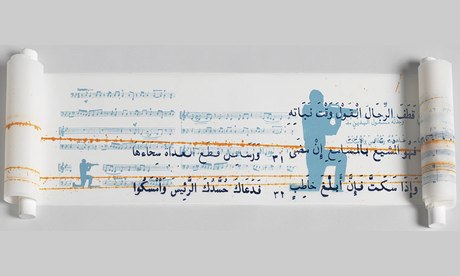Hundreds of writers and artists prepare tributes to Iraq's historic books hub, Al-Mutanabbi Street, hit by car bomb in 2007
'The scroll form made sense' … Iraqi Peace Song 2011, by Laurie Alpert. The text is by Al-Mutanabbi. Photograph: Mosaic Rooms | Al Mutanabbi Stre
It's said that when Baghdad was sacked by the Mongols in 1258, the river Tigris ran red one day with the blood of those killed, and black the next with the ink of their books. On 5 March 2007, many of Baghdad's books once again found themselves the victims of war when a car bomb exploded on Al-Mutanabbi Street, the city's historic literary district – home of booksellers, printers, and cafes, such as the famous Shabandar cafe, where Iraqi writers and intellectuals have been gathering for centuries.
On reading about the incident in the New York Times the next morning, Beau Beausoleil, a San Francisco-based poet and bookseller, felt an immediate connection: "I knew that if I was an Iraqi that's exactly where my store would be, among the other bookshops … As a poet that would be my cultural community." With the bomb, Beausoleil felt that the "tremendous pressure from the government and the media to see people as the other" was punctured; the distance collapsed.
Beausoleil felt compelled to take action to let "people in the west know that we share this commonality with Al-Mutanabbi Street". In his mind, the response had to be not only vocal but ongoing: "you have to continue to show up and make people think about what is happening and how that relates to their own lives". So began the Al-Mutanabbi Street project.
It started with a call to letterpress printers to create broadsides – a large sheet of paper printed on one side only, traditionally a poster. Beausoleil felt that letterpress artists were most apt for a first, "tactile, personal response" – "they're the people who have historically reacted to national tragedy or aspirations for a more just society by putting a broadside up on the side of a building or tree". A few years on, the project has gathered a collection of broadsides, 133 of which have been digitised by the Florida Atlantic University Libraries to be donated to the National Library and Archive of Iraq. The original target was 130, a number chosen to symbolise the 100 people wounded and the 30 killed that day.
More
On reading about the incident in the New York Times the next morning, Beau Beausoleil, a San Francisco-based poet and bookseller, felt an immediate connection: "I knew that if I was an Iraqi that's exactly where my store would be, among the other bookshops … As a poet that would be my cultural community." With the bomb, Beausoleil felt that the "tremendous pressure from the government and the media to see people as the other" was punctured; the distance collapsed.
Beausoleil felt compelled to take action to let "people in the west know that we share this commonality with Al-Mutanabbi Street". In his mind, the response had to be not only vocal but ongoing: "you have to continue to show up and make people think about what is happening and how that relates to their own lives". So began the Al-Mutanabbi Street project.
It started with a call to letterpress printers to create broadsides – a large sheet of paper printed on one side only, traditionally a poster. Beausoleil felt that letterpress artists were most apt for a first, "tactile, personal response" – "they're the people who have historically reacted to national tragedy or aspirations for a more just society by putting a broadside up on the side of a building or tree". A few years on, the project has gathered a collection of broadsides, 133 of which have been digitised by the Florida Atlantic University Libraries to be donated to the National Library and Archive of Iraq. The original target was 130, a number chosen to symbolise the 100 people wounded and the 30 killed that day.
More

2 comments:
Dear Graham Beattie,
My name is Beau Beausoleil, I am the founder of the Al-Mutanabbi Street Coalition. Each year we encourage writers and artists to put together a reading for al-Mutanabbi Street. We have 24 that will happen,in the US, the UK, Canada, and one in Australia. I'm wondering if you might consider putting one together in New Zealand, on or about March 5th.
All my best,
Beau Beausoleil
I can't do this but is there anyone out there who might be interested?
Post a Comment